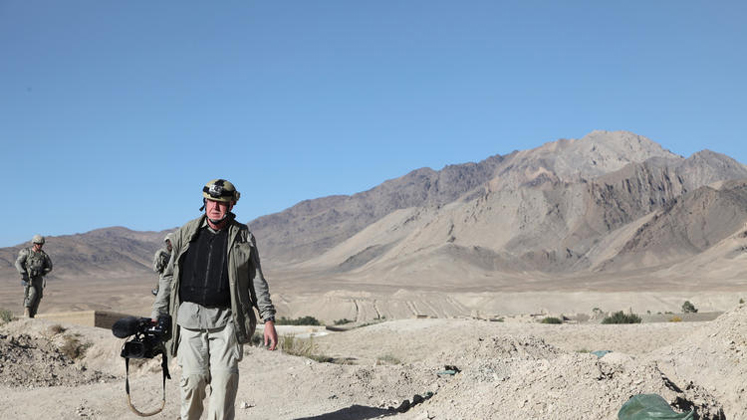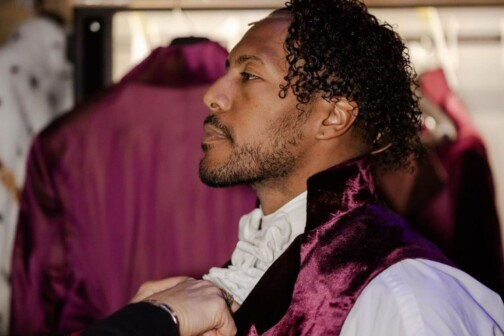In almost four decades as a war correspondent for two major news networks, Mike Boettcher has been kidnapped in El Salvador and almost died from a roadside bomb in Baghdad. He’s captured it all on camera, putting himself in harm’s way to tell the story instead of becoming the story.
But his world travels also caused some strain on his family life over the years, particularly in Boettcher’s relationship with his son, Carlos. So when one of Boettcher’s recent assignments required him to be embedded with American troops in one of the most notorious war zones in Afghanistan, 22-year-old Carlos wanted to tag along.
The resulting footage won an Emmy for both father and son, which had never happened before. It also provided the basis for The Hornet’s Nest, an immersive documentary that combines the courageous story of soldiers at war with that of an unusual reunion between father and son.
At first, the duo was hesitant. But the filmmakers were adamant about the father-son angle being a key component to the mainstream potential of the film, which caused the Boettchers to reconsider their stance.
“It makes me uncomfortable,” Mike Boettcher said during a recent stop in Dallas. “I’m not an anchor. I’m a front-line war correspondent. That’s what I do. To turn the camera on myself wasn’t easy. I didn’t want this father-son storyline to overshadow everything else.”
The film uses the footage captured by the Boettchers in some of the most remote and dangerous regions of war-torn Afghanistan, while enduring temperatures that reached 140 degrees and carrying 85 pounds of gear at 8,000 feet of altitude, frequently facing gunfire along the way.
It takes place over the course of four years, beginning with a 2008 assignment in Iraq. The two major embeds lasted about 27 months combined, not counting multiple trips that each has made to the region since then, during which they accumulated more than 500 hours of footage.
“It was the toughest assignment I’ve ever done,” Mike said. “You couldn’t just go back to the hotel and stay in a nice bed. To tell this story properly, we had to put ourselves in their boots.”
When Carlos came to his father with the idea of going with him on the assignment, Mike obviously was skeptical because he knew the dangers of the front lines as a journalist, especially for a novice.
“I knew it was going to be bad enough for me, and my son had no experience in a combat zone before. The last thing I could let happen was to let my son die,” he said. “I thought about it, and we’re out there with 18- and 19-year olds who were younger than Carlos. If he wanted to do it and knew what the consequences were, then I wanted him there with me.”
It wasn’t until after the harrowing conflict central to the film that Mike knew the footage they captured was special, and he wanted to find a different avenue for disseminating outside of the occasional report on “Nightline.”
A mutual acquaintance from Mike’s early career as a broadcast journalist in Oklahoma led him to the producing team of David Salzberg and SMU graduate Christian Tureaud, who make their joint directorial debut on The Hornet’s Nest. A handful of other SMU alumni served as executive producers.
“He’s telling the country the stories that need to be told,” Tureaud said. “This can be a bridge between the civilian and the military world. That’s our goal with the film.”
Carlos was born while Mike was on assignment in South Africa, covering the 10th anniversary of the Soweto riots. He always had an interest in cameras, and so perhaps it shouldn’t be surprising that he was able to adapt quickly.
“He was born into conflict. He was on my shoulders at the Berlin Wall. He was there when I came back from Desert Storm. He saw me go to all of these other places,” Mike said. “Something rubbed off, I think.”
Carlos, who studied international affairs specializing in counterterrorism while in college, said that despite some close calls, the wartime experience was both eye-opening and rewarding.
“We had a bonding experience like no other,” Carlos said. “If you think very far back, it was actually really common for fathers and sons to go to war together. Our experiences brought us together. Everything we’ve gone through has been a crucible that has formed both of us at the same time.”
Carlos said that besides the bonding aspect, their shared journey gave him insight into not only where his father had been going all these years, but why he went there.
“As I grew older, I came to appreciate what his job had allowed him to do, which is to stand at the gates of history again and again,” said Carlos, who has since launched a new career following in his father’s footsteps. “Doing this project was a chance for me to gain the same vantage point that my father had for his entire professional career. Once you’re there, you really start to understand it.”






